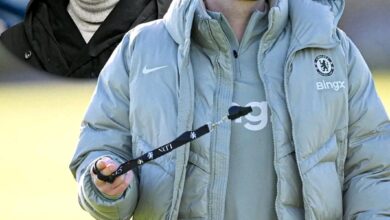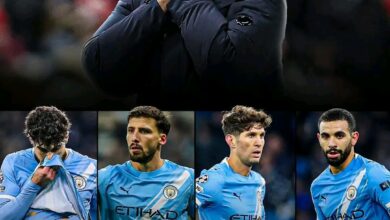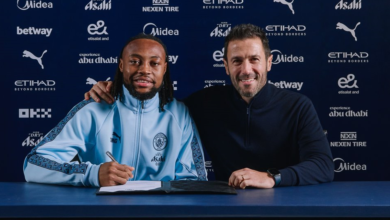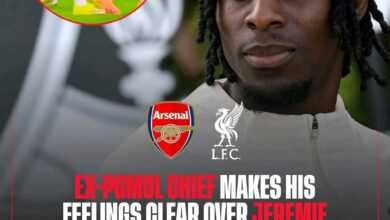Congratulations for costing us this game”, “He was terrible” – Fans slam Manchester City star for showing after 2-1 loss to Newcastle By Sripad

Manchester City went to St James’ Park with confidence, with pride, with the belief that their four-game winning run would continue, but football does not care about confidence and football does not care about reputation, because on that night in Newcastle, everything collapsed in the most painful way possible, and at the centre of the storm was a name nobody expected to see trending for the wrong reasons: Phil Foden. It was supposed to be just another Premier League match, just another step in the title race, but as the final whistle echoed through the cold night and the Newcastle fans roared in celebration like lions who had waited for this moment for years, thousands of Manchester City supporters went online not to defend their players, not to show unity, but to unleash emotions that had been boiling inside since the second goal went in. Many didn’t hold back. They didn’t try to soften their words. They didn’t try to pretend. They pointed directly at one man and spat out their frustration: “Congratulations for costing us this game”, “He was terrible”, “Pep needs to drop him”, “He should not start against Leverkusen”, “He needs to wake up”, “He can’t keep losing the ball in big matches”, the comments came flooding like rainfall that never wanted to stop. Foden, the golden boy, the academy hero, the one fans used to call the future of Manchester City, suddenly found himself at the heart of criticism after a night where nothing worked for him.
The match started with intensity, with high pressing from both sides, and Manchester City were not bad at the beginning. They were moving the ball, they were controlling possession, they were pushing Newcastle back little by little, but as minutes passed, cracks began to appear, not in the tactics, not in Pep Guardiola’s system, but in individual decisions. Every misplaced pass from Foden brought sighs from the away fans. Every time he lost the ball, Newcastle counterattacked with danger. Harvey Barnes, hungry for redemption after missing a sitter in the first half, smelled uncertainty, he smelled vulnerability, and he ran like a man possessed every time City’s midfield lost control. What happened after halftime will be remembered not because of brilliance, but because of reactions. Barnes struck once, he struck again, and even though Dias equalised in between, the atmosphere inside St James’ Park showed who wanted it more. Newcastle fought like their lives depended on it. City looked like a team waking up from a dream they could not continue.
Phil Foden is not a bad player. Everyone knows that. Pep knows it. The fans know it. Rivals know it. But football can be cruel. Football does not care about your past achievements or your potential. Football only cares about what you did today, and today, according to the fans, Foden did not do enough. The statistics were not friendly to him either. Too many loose touches, too many slow decisions, too many failed attempts to dribble when the simple pass was open. On a normal day, fans would shrug and move on, but this was not a normal day. This was the day City desperately needed to win to close the gap on Arsenal, and instead, they dropped points again at a stadium where victories never come easy.
When the final whistle blew, the camera zoomed in on Foden’s face. He walked slowly. His head down. His lips pressed together like someone trying to hold in emotions. He didn’t look angry. He didn’t look arrogant. He looked human. But football supporters in pain do not always care about feelings. As soon as the match ended, social media turned into a volcano. Many fans were furious that Foden stayed on the pitch as long as he did. Some went as far as saying Pep should have substituted him earlier to save the match. Some went even deeper, blaming previous matches, blaming previous slow performances, blaming decision making. Football can lift you in one week and break you the next.
Pep Guardiola faced the cameras and smiled the way only managers who have seen everything can smile. He did not blame Foden. He refused to blame individuals. He kept his composure, saying the match was tight, that both teams played with intensity, that City had chances but failed to finish. He praised the team’s pressing, their physicality, their movement. Some fans appreciated it. Others did not want diplomacy. They wanted accountability. They wanted emotions. They wanted someone to say “we were terrible today”. But Pep is Pep. He protects his players even when the world is pointing fingers. He did not step into the storm the fans wanted, but the fans continued the storm on their own. They were angry about the goal Newcastle scored to restore their lead. They said the build-up of that attack was triggered by yet another turnover that should never have happened. The disappointment was not only about losing, but about losing a match they could have controlled.
Some fans even compared performances and said players like Bernardo Silva, Rodri and Julián Álvarez were trying to pull the team forward while others slowed the rhythm. The irony is that football does not hold permanent favourites. Even the most loved players get criticised when the pain of defeat cuts deep. Foden once received applause for everything he touched. Now he faced the other side of football, the side where your biggest fans become your sharpest critics. But this is not hatred. This is heartbreak. This is passion. This is football. The higher the expectations, the harder the fall.
Newcastle fans celebrated loudly because they knew what the victory meant for their season. But Manchester City fans did not go silent either. They feared the consequences. Arsenal were already four points above them, with a game in hand. Dropping points was not part of the script. Every match now is like a final in the title race, and losing one puts the pressure even higher. Some fans were scared that the momentum before the international break had disappeared. Others believed that the Champions League match against Bayer Leverkusen in midweek would be the true test of character. Everyone hoped the team would react, but the name on all their lips remained Foden.
When Ruben Dias spoke after the game, he didn’t hide from the truth. He said it was a difficult match, intense in every way, that City had many chances but failed to convert, that Newcastle scored from their only real opportunities, and that City needed to be better. He complimented Newcastle. He admitted they were strong at home. He sounded honest, he sounded mature, but no matter how calm Dias sounded, the fans inside social media were not ready to calm down. Even as Dias spoke on TV, comments online were still flowing, still attacking, still expressing pain, anger and disappointment targeted at one player.
Some fans begged for Foden to be rested. Some asked for him to be benched until he regained confidence. Some blamed fatigue from international duty. Some blamed motivation. And then there were those who defended him passionately, reminding others that Foden has saved City countless times before, reminding people that young players sometimes have bad games, reminding critics that the title race is long. Within the same fanbase, different emotions collided like waves in a stormy sea. That is what happens when you support a club that expects perfection every wmeekend.
Phil Foden might not say anything publicly, but he has eyes. He will see the comments. He will feel the mood. Footballers pretend criticism does not affect them, but everyone knows they are humans before they are athletes. He knows what expectations look like, because he grew up in Manchester City’s academy with pressure on his shoulders from age 17. He knows the spotlight is always on him. But this moment could define his season. A player can collapse after criticism or rise to silence everyone. The next performance will be watched more than ever.
Manchester City now face Bayer Leverkusen in the Champions League. A match under the lights. A match where the world is watching. A match where players either hide or shine. Some fans are scared Pep will keep Foden in the starting XI. Others are scared he will drop him. Either decision will cause debate. That is football at the highest level. Every decision affects narratives. Every poor match becomes a headline. Every mistake becomes a story. Every victory hides everything and every defeat exposes everything. Football is beautiful and football is cruel because it never sleeps.
Manchester City then play Leeds United in the Premier League shortly after. Another must-win game. Another chapter in a title race that refuses to slow down. Another battle where every misplaced touch will be analysed. Another test where Phil Foden will either redeem himself or drown deeper in criticism. But this is football. Today’s villain can become tomorrow’s hero. Today’s scapegoat can become tomorrow’s match winner. The same fans who shout in anger can be the same fans who shout his name in celebration later. That is why football is emotional, unpredictable and addictive.
Fans cry not because they hate their players, but because they love their club. They want success. They want perfection. They want pride. They want to feel something. And defeat triggers the deepest emotions because football is not entertainment for them, football is a relationship, football is pain and joy mixed together. That is why they pointed fingers so quickly. That is why they questioned Foden. Not because they are enemies, but because they care too much.
Phil Foden will recover. Or he won’t. That is the drama football creates. The next match will begin and everything can change. If he scores, the same people who criticised him will kneel in praise. If he struggles, the criticism will multiply. But that is the price of being a star in a team that wants everything. When you wear the Manchester City shirt, the world watches. The world expects. The world judges. You are celebrated when you fly and targeted when you fall. Heroes and villains are created every week.
As the night settled and the anger on social media slowly cooled, fans were left with one truth. They did not lose because they are a bad team. They lost because football is ruthless. Newcastle took their chances. Manchester City did not. That is the summary no one argued about. Pep knows it. Dias knows it. The players know it. And Foden more than anyone knows it. The next step now is to respond. To show character. To show hunger. To show that mistakes do not define careers. Only reactions do.
And so, as the football world waits for the next match, only one question remains in the air. Will Phil Foden bounce back and prove everyone wrong, or will he collapse under pressure and let this defeat haunt him? The answer will arrive soon. Because football never waits. Football never pauses. Football keeps going and everyone must keep going with it, no matter how loud the criticism becomes















